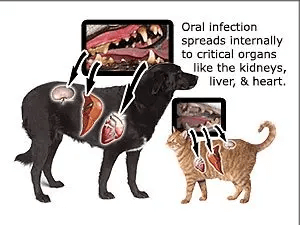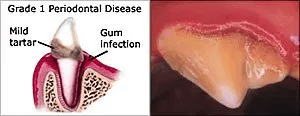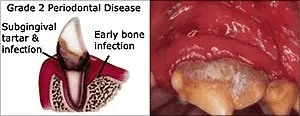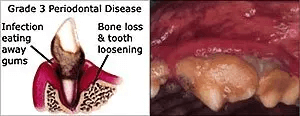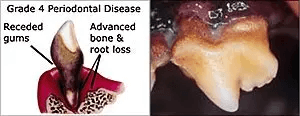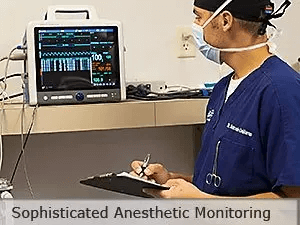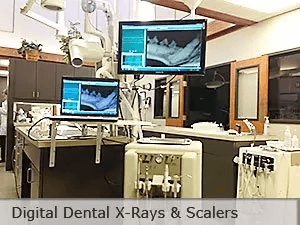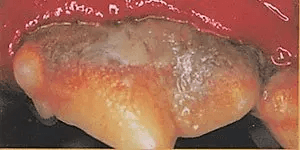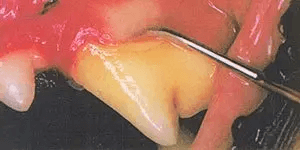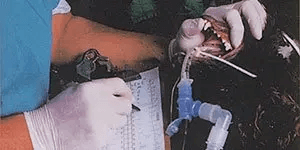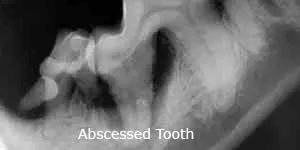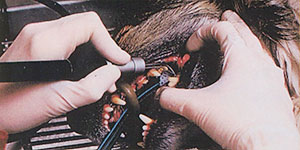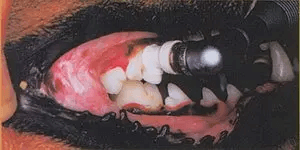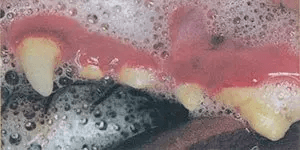Veterinary Dentistry Services
Dental cleaning (prophy), digital dental radiography, extractions, and oral surgery for dogs and cats in Blue Springs and surrounding Kansas City areas.
WHY IS DENTAL DISEASE A SERIOUS CONCERN FOR PETS?
Because pets develop periodontal infections and tooth root abscesses just like people, but can not communicate when they have a tooth ache, dental disease in pets often progresses to a very serious health problem.
Periodontal disease is a bacterial infection of the teeth roots and bony structures that cradle the teeth. The infection eats away the bone and causes teeth to loosen and eventually fall out. Additionally, the mouth becomes a dangerous source of infection as the bacteria spread through the blood to the internal organs. The heart, kidneys, and liver are especially susceptible to infection originating from infected teeth and gums.
DENTAL EXAMINATION
Every physical examination by one of our veterinarians includes an oral exam to determine the health of your pet’s teeth and gums. Dental disease is evaluated according to a standardized rating system:
- Grade 1: The gums are red and inflamed from tartar and infection (gingivitis), but the infection has not yet spread to the tooth root and bony structures (periodontitis). The gums may be tender, but the tooth is not painful. The condition is completely reversible with a dental cleaning and home care.
- Grade 2: The infection has spread from the gums to the deeper tissues and is starting to destroy the bone around the tooth. The gums are tender and there may be mild pain in the tooth. An odor may be noticeable. The condition is still reversible with regularly scheduled sub-gingival dental cleanings and home care.
- Grade 3: The infection has eaten away at the gums (receded gums) and is destroying the bone around the tooth. The gums are tender and may bleed when touched. There is pain in the tooth and surrounding area. An odor is noticeable. The condition may be irreversible, but if the tooth is still solid, the infection can be controlled with regularly scheduled sub-gingival dental cleanings and a rigorous home care schedule.
- Grade 4: The infection has receded the gums away from the tooth root and destroyed the bone around the tooth. There is significant pain in the tooth and surrounding area. An odor is noticeable. The condition is usually irreversible for the tooth, which must be extracted in order to alleviate pain and eliminate the infection in the gums and surrounding bone.
ANESTHESIA FOR DENTAL PROCEDURES
When the veterinarian diagnoses your pet with dental disease, they will recommend anesthesia for a dental evaluation and cleaning. Anesthesia is required in pets for a proper evaluation and treatment of dental disease. The anesthesia will prevent anxiety or pain and allow opening of the mouth and complete access to the teeth. A tube will be placed in the trachea to prevent inhalation of infected debris.
The risk with anesthesia is very small compared to the significant risk of infection and internal organ damage that occurs with untreated dental disease. At Blue Springs Animal Hospital we have extensive experience and use the very best drugs and equipment to administer and monitor anesthesia. To decrease the anesthetic risk even further we also highly recommend (but do not require) pre-anesthetic lab work and IV fluids during the procedure. Please visit the surgery page on this site for more information on anesthesia, pre-anesthetic testing, and IV fluids during anesthesia.
Most pets will go home the same day after their dental cleaning. It is normal for pets to be groggy and either sleepy or restless for 12-24 hours after the procedure due to the anesthetic and pain medications. Their appetite and behavior will return to normal in 1-2 days. Many owners then report that their pets feel so much better than before the procedure!
DENTAL EQUIPMENT & STAFFING
Our hospital is well equipped for dentistry procedures with ultrasonic cleaners, drills, high speed polishers, and digital dental radiography (X-rays).
A well-trained staff of licensed veterinary technicians assist the doctors.
DENTAL EVALUATION & CLEANING
The veterinarian recommended a dental evaluation and cleaning for this pet. The tartar is causing infection of the gums, as evidenced by the redness and swelling above the tooth.
DENTAL CLEANING STEP 1: HAND SCALING
The dental evaluation and cleaning starts with hand scaling the tartar off and doing a thorough examination of the teeth, checking for loose teeth, fractures, and using a dental probe to search for pockets. Pockets are areas where the gums have pulled away from the tooth and tartar and infection have accumulated.
DENTAL CLEANING STEP 2: CHARTING
Observations about each tooth are recorded on special dental charts – essentially creating a “map” of the pet’s mouth. All abnormalities and treatments performed are recorded for future reference.
DENTAL CLEANING STEP 3: X-RAYS
Teeth which feel loose or have pockets will have X-rays to evaluate for bone loss and root abscesses. Our goal is to preserve teeth whenever possible. But, teeth which are loose, abscessed, or have irreversible (Grade 4) periodontal disease will be a continued source of pain and infection. These teeth should usually be extracted to allow the gums and jaw bone to heal.
DENTAL CLEANING STEP 4: ULTRASONIC CLEANING
Next the teeth are thoroughly cleaned using an ultrasonic dental cleaner to loosen and remove all tartar and debris from the teeth and under the gums.
DENTAL CLEANING STEP 5: POLISH
The now sparkling clean teeth are polished with a high speed polisher to smooth the surfaces and slow future tartar accumulation.
DENTAL CLEANING STEP 6: FLORIDE TREATMENT
Finally, a foaming fluoride treatment is applied to protect and strengthen the teeth.
DENTAL HOME CARE
Home care alone will not remove tartar or treat infection, but it can greatly reduce future tartar accumulation and reduce the frequency of future dental procedures. It also keeps your pet’s breath smelling much fresher!
One important fact to keep in mind with home care is that plaque (the soft film that develops on teeth composed of food particles, saliva, and bacteria) calcifies into hard tartar within 24 hours. This means that home care must be provided at least ONCE DAILY to be effective.
The Veterinary Oral Health Council has compiled a list of Recommended Dental Products which can be used at home. Options for Home Care include:
Tartar Control Food
Dental foods are especially formulated to prevent tartar and clean the teeth while your pet eats their dinner! These diets are a very effective preventative if used as the pet’s sole diet on a regular basis. The food works by decreasing the particles available for tartar formulation and also by mechanically rubbing the tartar off the teeth as the pet chews.
Dental Chews
Various types of dental chews are available that can reduce plaque and tarter. Some are coated with enzymes to reduce tartar along with the mechanical action of chewing. Dental chews may be used in addition to brushing, or as an alternative for pets who will not tolerate brushing.
Tooth Brushing
Brushing the teeth every day with a special pet toothpaste (do not use human toothpaste) is the best way to reduce tartar and gingivitis. Most pets love the taste of the pet toothpaste and can be taught easily to accept brushing. A few pointers for success:
- Brushing must be done everyday to be effective, so find a way to make it part of your daily routine. Maybe you can brush your pet’s teeth every night before you brush your teeth?
- Start slowly so your pet does not become afraid or resistant. Start with paste on your finger, be gentle, and work your way up to a finger brush, tooth brush, or spinner brush.
- As your pets accepts it, brush the outside surface of all the teeth, gently lifting the lip to get the teeth in the back. It is not usually possible or necessary to brush the inside surface (by the tongue) as this surface builds less tartar than the outside.
- Make it fun and give lots of praise. Pretty soon your pet will look forward to it every day!
- View the video below for a demonstration.
Depending on how well you are able to care for your pet’s teeth at home, and on your pet’s predisposition to building tartar, most pets will need professional dental cleanings every few months or years to maintain good dental health. The veterinarians at Blue Springs Animal Hospital will examine your pet’s teeth at every visit and make individualized recommendations based upon your pet’s needs.

